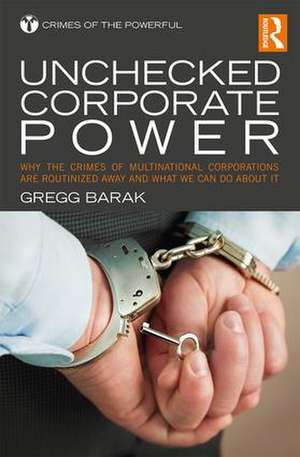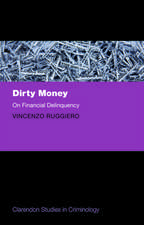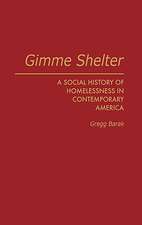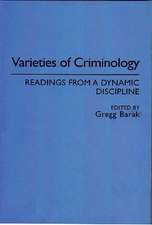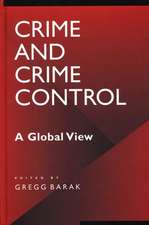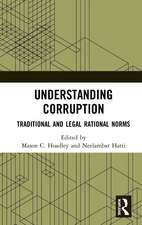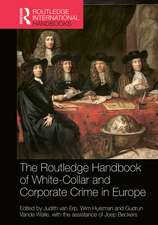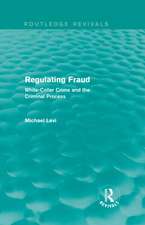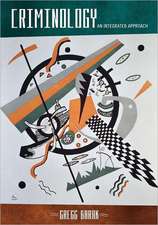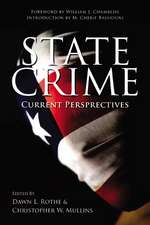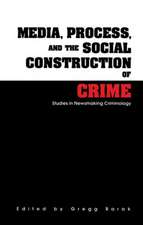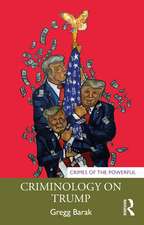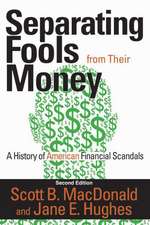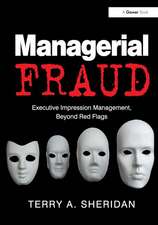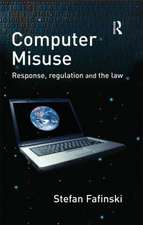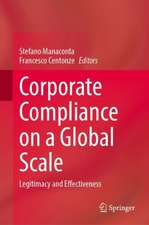Unchecked Corporate Power: Why the Crimes of Multinational Corporations Are Routinized Away and What We Can Do About It: Crimes of the Powerful
Autor Gregg Baraken Limba Engleză Paperback – 21 feb 2017
Written from the perspective of global sustainability and as an unflinching and unforgiving exposé of the full range of the crimes of the powerful, Unchecked Corporate Power reveals how legalized authorities and political institutions charged with the duty of protecting citizens from law-breaking and injurious activities have increasingly become enablers and colluders with the very enterprises they are obliged to regulate. Here, Gregg Barak explains why the United States and other countries are duplicitous in their harsh reactions to street crimes in comparison to the significantly more harmful and far-reaching crimes of the powerful, and why the crimes of the powerful are treated as beyond incrimination.
What happens to nations that surrender ever-growing economic and political power to the globally super rich and the mammoth multinational corporations they control? And what can people from around the world do to resist the criminality and victimization perpetrated by multinationals, and generated by the prevailing global political economy? Barak examines an array of multinational crimes—corporate, environmental, financial, and state—and their state-legal responses, and outlines policies and strategies for revolutionizing these contradictory relations of capital reproduction, criminality, and unsustainability.
| Toate formatele și edițiile | Preț | Express |
|---|---|---|
| Paperback (1) | 350.12 lei 6-8 săpt. | |
| Taylor & Francis – 21 feb 2017 | 350.12 lei 6-8 săpt. | |
| Hardback (1) | 764.20 lei 6-8 săpt. | |
| Taylor & Francis – 21 feb 2017 | 764.20 lei 6-8 săpt. |
Preț: 350.12 lei
Nou
Puncte Express: 525
Preț estimativ în valută:
66.99€ • 69.95$ • 55.32£
66.99€ • 69.95$ • 55.32£
Carte tipărită la comandă
Livrare economică 15-29 aprilie
Preluare comenzi: 021 569.72.76
Specificații
ISBN-13: 9781138951440
ISBN-10: 1138951447
Pagini: 212
Dimensiuni: 156 x 234 x 11 mm
Greutate: 0.3 kg
Ediția:1
Editura: Taylor & Francis
Colecția Routledge
Seria Crimes of the Powerful
Locul publicării:Oxford, United Kingdom
ISBN-10: 1138951447
Pagini: 212
Dimensiuni: 156 x 234 x 11 mm
Greutate: 0.3 kg
Ediția:1
Editura: Taylor & Francis
Colecția Routledge
Seria Crimes of the Powerful
Locul publicării:Oxford, United Kingdom
Public țintă
Postgraduate and UndergraduateCuprins
Preface
Part I: Routinizing the Crimes of the Powerful
Introduction: On the State Routinization of Unchecked Corporate Power
1. Capitalism, Corporations, and Criminality
1.1 Globalizing Capital and Crime
1.2 Studying Multinational Corporate Crime and the Public’s Right to Know
1.3 From Felonies to Torts: Constrained and Unconstrained Corporations
1.4 Power, Growth, and Inequality in Early 21st Century Capitalism
1.5 Capitalism and the Contradictory Nature of Capital Accumulation, Capitalist Crisis, and Corporate Criminality
1.6 State Routinized Crime Control and the Capitalist Apparatus
2. Why Capitalist States “Fail” to Control the Crimes of the Powerful
2.1 State-Routinized Crime
2.2 State-Routinized Crime Control, Regulation, and Accountability
2.3 Police Use and Misuse of Force, Militarizing U.S. Law Enforcement, and Privatizing the Security Industry
2.4 U.S. Counter-Terrorist Torture and the Outsourcing of Harsh Interrogation Techniques
2.5 Wall Street and the Routinization of Securities Fraud
2.6 A Recapitulation of State Routinized Crime and Crime Control
Part II: Violating the Commons
3. Financial Crimes: Violations of Trusted Securities
3.1 Decriminalization, Fraudulent Libor Rates, and Victimization
3.2 The Contradictory Forces of Free-Market Capitalism and Securities Law Failures to Curb Wall Street Frauds Before and After the Financial Implosion
3.3 Treating High-Risk Securities Fraud as Noncriminal Matters
3.4 Criminal and Civil Prosecutions
3.5 Structured Finance Products, Investment Banking Fraud and the Case Against Goldman Sachs
3.6 Conciliatory Collusion, Goldman Sachs, and the Costs of Doing High Finance
3.7 The Big Banks, SEC Waivers, and State Financial Resources
3.8 Update: “Short Sellers Sold Short By Goldman”
4. Environmental Crimes: Violations of Health and Safety
4.1 Green Criminology, Environmental Crimes, and Structural Harms
4.2 Exposing West Virginians to Toxic Substances: DuPont, Cover-Up, Litigation and Decades of Chemical Pollution
4.3 Dow Chemical Company: A Trailblazer in Multinational Criminality
4.4 Monsanto Corporation: Masters of Fraud, Deception, and Public Relations
4.5 Unfettered Fracking and the Dangers of Hydraulic Fracturing
4.6 Climate Change, Power Plant Regulations, and the U.S. Supreme Court Stay as a Potential Unraveling of the Paris Agreement?
5. Colluding Crimes of States and Corporations: Violations of the Community
5.1 Routinizing Collusion Between and Within Nations: The Neutralization of Crime and the Rise of Securitization
5.2 Transparency, Surveillance, Whistleblowing, and Drone Warfare
5.3 Crimmigration and Privatization: Cashing in on Refugee Desperation
5.4 For Profit Charter Schools and the Privatization of Education: Looting the Public Purse at the Expense of the Public Interest
Part III: Halting Corporate Harm
6. Checking Corporate Power and State-Routinized Crime in an Age of Global Capitalism
6.1 Educational Debt and the Need for Collective Bargaining not Collective Punishment: Implications for Resisting State-Routinized Debtors
6.2 Reclaiming the Older and Newer Commons
6.3 The Sustainable Paradigm and Changing the Political Culture
6.4 From Manufacturing to Postindustrialism and Services: Building a Sustainable Global Economy
Conclusion: Democratic Capitalism, State Owned Multinationals, and Sustainable Pragmatism
Index
Part I: Routinizing the Crimes of the Powerful
Introduction: On the State Routinization of Unchecked Corporate Power
1. Capitalism, Corporations, and Criminality
1.1 Globalizing Capital and Crime
1.2 Studying Multinational Corporate Crime and the Public’s Right to Know
1.3 From Felonies to Torts: Constrained and Unconstrained Corporations
1.4 Power, Growth, and Inequality in Early 21st Century Capitalism
1.5 Capitalism and the Contradictory Nature of Capital Accumulation, Capitalist Crisis, and Corporate Criminality
1.6 State Routinized Crime Control and the Capitalist Apparatus
2. Why Capitalist States “Fail” to Control the Crimes of the Powerful
2.1 State-Routinized Crime
2.2 State-Routinized Crime Control, Regulation, and Accountability
2.3 Police Use and Misuse of Force, Militarizing U.S. Law Enforcement, and Privatizing the Security Industry
2.4 U.S. Counter-Terrorist Torture and the Outsourcing of Harsh Interrogation Techniques
2.5 Wall Street and the Routinization of Securities Fraud
2.6 A Recapitulation of State Routinized Crime and Crime Control
Part II: Violating the Commons
3. Financial Crimes: Violations of Trusted Securities
3.1 Decriminalization, Fraudulent Libor Rates, and Victimization
3.2 The Contradictory Forces of Free-Market Capitalism and Securities Law Failures to Curb Wall Street Frauds Before and After the Financial Implosion
3.3 Treating High-Risk Securities Fraud as Noncriminal Matters
3.4 Criminal and Civil Prosecutions
3.5 Structured Finance Products, Investment Banking Fraud and the Case Against Goldman Sachs
3.6 Conciliatory Collusion, Goldman Sachs, and the Costs of Doing High Finance
3.7 The Big Banks, SEC Waivers, and State Financial Resources
3.8 Update: “Short Sellers Sold Short By Goldman”
4. Environmental Crimes: Violations of Health and Safety
4.1 Green Criminology, Environmental Crimes, and Structural Harms
4.2 Exposing West Virginians to Toxic Substances: DuPont, Cover-Up, Litigation and Decades of Chemical Pollution
4.3 Dow Chemical Company: A Trailblazer in Multinational Criminality
4.4 Monsanto Corporation: Masters of Fraud, Deception, and Public Relations
4.5 Unfettered Fracking and the Dangers of Hydraulic Fracturing
4.6 Climate Change, Power Plant Regulations, and the U.S. Supreme Court Stay as a Potential Unraveling of the Paris Agreement?
5. Colluding Crimes of States and Corporations: Violations of the Community
5.1 Routinizing Collusion Between and Within Nations: The Neutralization of Crime and the Rise of Securitization
5.2 Transparency, Surveillance, Whistleblowing, and Drone Warfare
5.3 Crimmigration and Privatization: Cashing in on Refugee Desperation
5.4 For Profit Charter Schools and the Privatization of Education: Looting the Public Purse at the Expense of the Public Interest
Part III: Halting Corporate Harm
6. Checking Corporate Power and State-Routinized Crime in an Age of Global Capitalism
6.1 Educational Debt and the Need for Collective Bargaining not Collective Punishment: Implications for Resisting State-Routinized Debtors
6.2 Reclaiming the Older and Newer Commons
6.3 The Sustainable Paradigm and Changing the Political Culture
6.4 From Manufacturing to Postindustrialism and Services: Building a Sustainable Global Economy
Conclusion: Democratic Capitalism, State Owned Multinationals, and Sustainable Pragmatism
Index
Notă biografică
Gregg Barak is Professor of Criminology and Criminal Justice at Eastern Michigan University, USA. He is the editor of The Routledge International Handbook of the Crimes of the Powerful, author of Theft of a Nation: Wall Street Looting and Federal Regulatory Colluding, and recipient of the National White Collar Crime Center/White Collar Crime Research Consortium’s Outstanding Book Award for 2012.
Recenzii
"Barak constructs a grand narrative which attests to the pervasiveness of corporate crime, the state routinization of the crimes of the powerful, and the unsustainability of multinational capitalism. Traversing the globe, and incorporating financial, health, safety and environmental crimes, financialisation and the commodification of the commons, this empirically and historically rich, theoretically sophisticated tour de force at the same time holds out the promise of effective challenge to unchecked corporate power."
Steve Tombs, Professor and Head of the Department of Social Policy and Criminology and Co-Director of the International Centre for Comparative Criminological Research, Open University, UK
"Gregg Barak advances a chastening indictment of contemporary capitalism. Both liberal capitalism and the growing strength of authoritarian capitalism in societies like China afflict profound domination upon citizens. Gregg Barak enriches the conversation about options for strategic regulation and strategic socialist innovation to temper if not tame their power."
John Braithwaite, Distinguished Professor, RegNet School of Regulation and Global Governance, Australian National University, Australia
"Unchecked Corporate Power is a thoughtful and thought-provoking examination of contemporary corporate harms, how economic, political and media elites have made them appear to be the unavoidable collateral damage of honorable profit-seeking, and how the regulatory system tasked with controlling these harms has not only turned them into non-crimes, but has often facilitated their perpetration. More than a critique of corporate harms, Unchecked Corporate Poweroffers both a call and a model for fundamental restructuring of the political relationships between corporations, the public, and government. It is a must read for both scholars and citizens concerned with the rising power of corporations and the declining power of average citizens."
Raymond J. Michalowski, Arizona Regents Professor, Department of Criminology and Criminal Justice, Northern Arizona University, USA
"In this pathbreaking book, Barak critically examines the roles of multi-national corporations and the state in both routinizing and trivializing major crimes and massive global harms. Using case studies he effectively exposes both the inherent contradictions and the need for change in current regulatory policies. The work not only offers a number of potential solutions, but is a major addition to the sociological and criminological understanding of global white-collar and corporate criminality. I highly recommend it."
Henry N. Pontell, Distinguished Professor and Chair of the Department of Sociology, John Jay College of Criminal Justice, and Professor Emeritus, Department of Criminology, Law and Society, University of California, Irvine, USA
Steve Tombs, Professor and Head of the Department of Social Policy and Criminology and Co-Director of the International Centre for Comparative Criminological Research, Open University, UK
"Gregg Barak advances a chastening indictment of contemporary capitalism. Both liberal capitalism and the growing strength of authoritarian capitalism in societies like China afflict profound domination upon citizens. Gregg Barak enriches the conversation about options for strategic regulation and strategic socialist innovation to temper if not tame their power."
John Braithwaite, Distinguished Professor, RegNet School of Regulation and Global Governance, Australian National University, Australia
"Unchecked Corporate Power is a thoughtful and thought-provoking examination of contemporary corporate harms, how economic, political and media elites have made them appear to be the unavoidable collateral damage of honorable profit-seeking, and how the regulatory system tasked with controlling these harms has not only turned them into non-crimes, but has often facilitated their perpetration. More than a critique of corporate harms, Unchecked Corporate Poweroffers both a call and a model for fundamental restructuring of the political relationships between corporations, the public, and government. It is a must read for both scholars and citizens concerned with the rising power of corporations and the declining power of average citizens."
Raymond J. Michalowski, Arizona Regents Professor, Department of Criminology and Criminal Justice, Northern Arizona University, USA
"In this pathbreaking book, Barak critically examines the roles of multi-national corporations and the state in both routinizing and trivializing major crimes and massive global harms. Using case studies he effectively exposes both the inherent contradictions and the need for change in current regulatory policies. The work not only offers a number of potential solutions, but is a major addition to the sociological and criminological understanding of global white-collar and corporate criminality. I highly recommend it."
Henry N. Pontell, Distinguished Professor and Chair of the Department of Sociology, John Jay College of Criminal Justice, and Professor Emeritus, Department of Criminology, Law and Society, University of California, Irvine, USA
Descriere
This book offers an exposé of the globalized, corporate, financial and state crimes of powerful organizations, drawing on a range of current cases from the recent epidemic of Wall Street securities frauds to the torturing of prisoners by the US.
